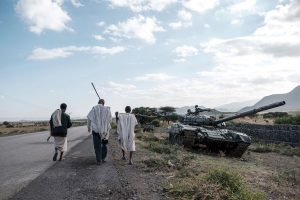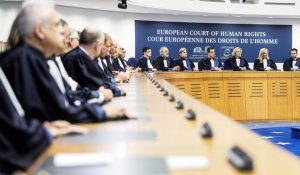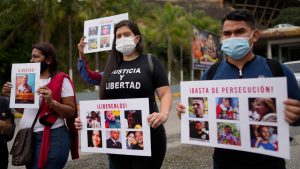By: Gabriella Kielbasinski
Journal of Global Rights and Organizations, Senior Articles Editor
WARSAW, Poland — The current reality: Poland and the European Union (EU) find themselves in a critical tug-of-war with dire implications for the future of rule of law and the primacy of EU law. Before addressing Poland’s latest pushback against EU primacy and rule of law, let’s look back at how the Polish judicial system has changed in order to accommodate such challenges to the most foundational tenants of EU law.

Since 2015, the Eurosceptic, right-wing Law and Justice Party (PiS) has increasingly taken control of Polish judicial bodies, including the Constitutional Tribunal, Supreme Court, and Prosecutor General’s Office. Organizations such as Human Rights Watch have noted that, under PiS’s influence, these courts “composition, independence, and functioning have been severely compromised.”
As PiS continued to infiltrate the should-be neutral judicial system, judges were replaced with PiS political allies. This raised many concerns about the overall integrity of Poland’s courts as they became increasingly politicized bodies. To reign in the remaining independent judges, PiS created a disciplinary process to sanction, and in some cases even remove, those who rule contrary to the party’s interests. This disciplinary regime continues to exacerbate the deterioration of judicial impartiality across the country.
Notably, the Court of Justice of the European Union (CJEU) weighed in on the aforementioned disciplinary system, holding that Poland’s disciplinary regime against judges is not compatible with EU law and should be immediately suspended. However, Poland has failed to comply with the order to disband it.
Looking now to 2021, on October 7th, the Constitutional Tribunal ruled that two core articles of the Treaty on European Union, Article 1 and Article 19, were “incompatible” with the Polish constitution asserting the “primacy of the Polish Constitution over EU Law.” This is a sharp deviation from the founding principles upon which the EU’s legal framework rests. Historically, primacy of European Union law was the precedent. In other words, where a conflict lies between EU law and national law, EU law should still prevail.
Observers have noted that this decision may create a dangerous precedent in which Poland can pick and choose which parts of EU law it will abide by. For independent judges struggling in Poland’s current judicial climate, this ruling inhibits their ability to rely on CJEU rulings or EU law in order to defend their decisions against PiS’s pressures. In other words, the October 7th decision has the power to wholly destabilize the already shaky legal framework of rule of law within Poland’s borders.
Moreover, human rights watchdogs have blown the whistle that this ruling not only curtails democratic interests in Poland, but also has the potential to hinder rule of law across the EU. Some world leaders worry that other EU states may follow suit after Poland, carefully selecting when EU law is binding based on the respective state’s self-interests. Sensing this potential for disaster, the European Commission was quick to respond calling out the serious concerns raised by the Polish Constitutional Tribunal and reaffirming that “EU law has primacy over national law, including constitutional provisions.”
Given the gravity of the harm at stake – the breakdown of the rule of law within the EU, it is unsurprising that other Europeans bodies also responded to the October 7th decision with decisive action: The European Parliament openly condemned the ruling; The EU has withheld €36 billion of stimulus funds for Poland; And, the European Court of Justice (ECJ) has imposed a daily fine of €1 million for Poland’s noncompliance with EU rules and orders, the highest daily penalty ever imposed on an EU state. One thing is clear, as economic consequences continue to pile up for Poland, tensions across the parties involved have only grown.
Most recently, it has been the European Court of Human Rights (ECHR) pushing back against the actions of Poland’s courts. On November 8th, the ECHR ruled on a case in which two Polish judges were rejected for positions by Poland’s Chamber of Extraordinary Review and Public Affairs. The ECHR ruled that the judicial applicants had been denied a fair hearing because the Polish body which heard their case “isn’t an ‘independent and impartial tribunal established by law.” Rather, it is a politicized body composed of members who are mostly politicians, not judges. The ECHR called Poland’s current running of the courts a “blatant defiance of the rule of law.”
Notably, the ECHR’s decisions are legally binding, not merely advisory, upon the members of the Council of Europe (which Poland is a member of).
In response, on November 24th, the Constitutional Tribunal said that the ECHR has no power to question its appointment of judges, thus rejecting the ECHR’s November 8th rulings. In a move mirroring the Tribunal’s previous October 7th holding, the rationale rested upon a finding that European law was “incompatible” with the Polish Constitution. Specifically, the Tribunal found that Article 6 of the European Convention on Human Rights was “incompatible… in as far as it gave the [ECHR] the right to assess the legality of the appointment of the Tribunal’s judges.”
While proponents of Poland’s controversial judiciary exalted the decision as a win for Polish sovereignty, others expressed concern calling the decision an “unprecedented challenge against a ruling from the European Court of Human Rights.” Any hope that Poland’s October 7th ruling was a unique departure from previously held legal principles seems effectively crushed by this latest decision. Some opposition lawmakers have gone as far as to label the November 24th ruling as an attempt to “[push Poland] out of the group of democratic countries.”
In the coming days, the European community’s response to Poland’s bold challenge to an ECHR ruling has the potential to shape the EU’s legal landscape for years to come.
For further information, please see:
BBC – Poland’s Top Court Ruling Marks Major Challenge to EU Laws – 7 Oct. 2021
Bloomberg – Poland Ordered by Top Human Rights Court to Fix Judicial System – 8 Nov. 2021
Euractiv – Poland Makes ‘Unprecedented’ Challenge to European Rights Pact – 25 Nov. 2021
European Commission – European Commission Reaffirms the Primacy of EU Law – 7 Oct. 2021
Human Rights Watch – Poland’s Compromised Court Threatens Rule of Law in Europe – 13 Oct. 2021
Politico – Poland Hit with Record €1M Daily Fine in EU Rule-of-Law Dispute – 27 Oct. 2021
Reuters – Polish Tribunal Rules European Rights Court Cannot Question Its Judges – 24 Nov. 2021.


